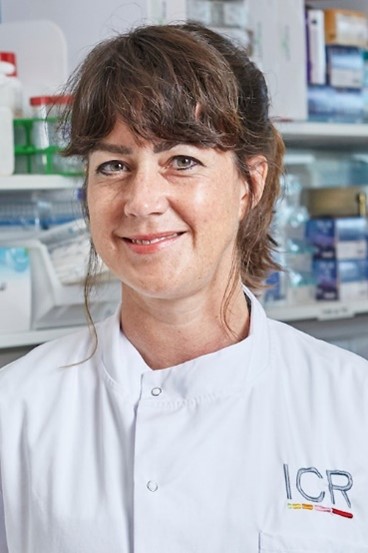Innovation
Streamlined, patient-directed pathways for germline genetic testing of cancer susceptibility genes
Competition
NHS Cancer Programme – Innovation Open Call – Competition 2

Name & role of Project Lead
Clare Turnbull, Professor of Translational Cancer Genetics and Consultant in Clinical Genetics, Institute of Cancer Research
Clinical Problem
The identification of patients with a germline genetic variant within cancer susceptibility genes supports the risk stratification of people at high genetic risk of developing cancer for targeted screening and prevention. Current pathways for the consenting of patients for testing are labour intensive, with 1-to-1 ‘genetic counselling’ with a trained healthcare professional prior to consent, and blood sampling primarily used as a DNA source. Eligibility for testing is therefore restricted to patients, based on personal and/or family history of cancer, adding an additional step of complex assessment prior to
referral. This can lead to missed opportunities for identifying people at high genetic risk of developing cancer.
Proposed Solution
Much of the information patients need to receive ahead of consenting to germline genetic testing is
largely generic in specific testing contexts, for example testing for breast and ovarian cancer susceptibility genes BRCA1 and BRCA2. There is well established knowledge relating to variant interpretation, the cancer risks associated with gene changes and lifestyle factors, and clinical actionability with regards to preventative options and screening for early diagnosis.
Our solution, BRCA-DIRECT offers an alternative pathway for germline genetic testing. It reduces the need for healthcare professional involvement in generic aspects of the pathway, allowing resources to be focused on managing individualised issues and/or patients with positive results and increasing testing capacity. This is done by providing patients with standardised written or digital information containing information about genetic testing, alongside a consent form and saliva sample kit for at-home patient-initiated testing. Support is freely accessible from a genetic counsellor via a centralised
telephone helpline.
The solution offers more opportunities to reduce a patient’s risk of developing future cancers (e.g. during primary surgery), with better outcomes by utilising targeted treatments for germline variants. It also increases identification of unaffected, at-risk family members, via cascade testing, who may benefit from targeted screening and prevention.
Market Traction and Implementation
-
The pathway is being implemented within the North Thames Genomics Laboratory Hub (NTGLH). This involves delivery of testing via the Centre for Molecular Pathology, at the Royal Marsden NHS Foundation Trust, part of the NTGLH network.
-
The first phase includes the Royal Marsden, Princess Alexandra, Imperial College, Royal
Free and Northwick Park hospitals.
Impact - Early detection and diagnosis of cancer
-
The BRCA-DIRECT pathway was established on the premise that all patients diagnosed with breast cancer could be offered testing because studies have demonstrated that expanded access to testing is (a) cost effective and (b) an opportunity to identify up to twice the number of people with a genetic variant compared with current family history-based eligibility criteria.
-
Patients identified through the study can now access increased screening or preventative options to reduce their future cancer risks, and on average will have six family members who become eligible for testing, each with a 50% risk of also having the genetic variant.
Impact - patient outcomes and experience
- Our study at two NHS Trusts identified high levels of patient satisfaction with the pathway. Additional patient interviews and clinician feedback also support evidence for the value of the pathway in terms of expanding access to testing and the benefit this can have for alleviating patient anxiety around family
members being at-risk of developing cancer at the time of a personal diagnosis.
Impact - Service Delivery
-
The majority of surveyed clinicians and healthcare professionals considered all aspects of the pathway to be equivalent or superior as compared with standard-of-care pathway, with >95% believing that the pathway was acceptable for the majority (>70%) of patients, and supporting larger roll-out of the pathway within the NHS as standard-of-care.
-
Uptake of the hotline requiring genetic counsellor input was shown to be modest, with the vast majority of calls for support being administrative in nature (i.e. support registering online or completing the saliva sampling).
Clinician quote
"BRCA-DIRECT enables me to offer all newly diagnosed patients access to testing in a straightforward, timely manner. It means results are available to use during their treatment pathway and for future
cancer prevention. I am delighted to offer this."
Royal Marsden Hospital Clinician
"It’s been great. It’s brought me a huge deal of relief to have this opportunity and also the method through which I was given to participate. I personally find reading information, especially information which can cause different responses, better to receive privately because it gives me more space to somehow process it than if I was in a conversation with a health professional."
BRCA-DIRECT study participant
Date Published
September 2023

